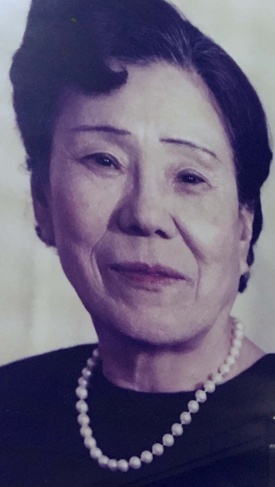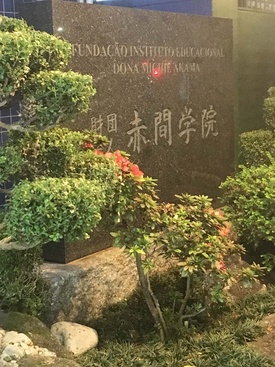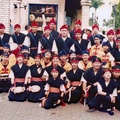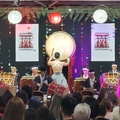
Born in Japan and graduated in Education, Michie Akama came to Brazil in the 1920s with her family to work on the coffee farm. Here, she is faced with a reality that is very different from the one she knew in her homeland, as people did not have access to school. “Her dream of wanting to do something within an educational context starts from there.”
The person telling this story is Irma Akamine Hiray, former teacher and current general director of the Pioneer Educational Center, the former school called the Cutting and Sewing Teaching House, known as Akama Gakuin, founded by Michie.
The opening of the school
Michie moves to São Paulo and starts with the Akama Gakuin school, a study and culture center aimed exclusively at females, which operated as a boarding school and had several addresses until definitively settling in the Vila Clementino neighborhood. The young women – some from families who worked in the fields – took classes in tailoring, Japanese language, foreign languages as well (English and French at that time), as well as domestic economics.
But her objective was not to specifically teach cutting and sewing. She had a bigger vision and believed that through knowledge she would be able to provide conditions for these girls to become well prepared.
Some practices could help them with the family's domestic economy when they get married. In Japanese culture, there are preserves, tsukemono . Mastering this technique would serve not only to preserve food, but also to produce products that could later contribute to family income.
This school grew with the help of the Japanese community. Therefore, today there are still around 70% of Japanese descent among the almost 800 students. However, Michie never wanted this school to be along the lines of a Japanese school. “Because she always said: I’m the foreigner in this country.”
Despite thinking this way, she shows that she had made the choice of home, which was no longer Japan. When her son Antonio was eight years old, she took him to her home country so he could study, the same time her husband Juiji passed away. “She returns to Brazil because of this school for preparing girls. Identification with the country was very strong, because she had the opportunity”, comments the director.
Michie Akama creates his foundation and expands school

“In 1959, she transformed all of her assets, which involved this school, into a foundation, the Fundação Instituto Educacional Dona Michie Akama. She understood that if the school she had until then was built with the help of the community, it did not belong to her, it belonged to all of us. The foundation currently supports the Pioneiro Educational Center”, he explains. It was a way of showing gratitude to the country that welcomed her and to everyone who helped her build this legacy.
As a foundation, it cannot be for-profit. There is no contribution of foreign capital and the amount raised from the monthly fee goes to the school itself, “which is a source of great pride. We are able to breathe education.”
Over time, this teaching model for girls no longer makes sense, as people begin to have access to schooling. In 1971, at the age of 68, Michie founded Pioneiro, which offers everything from Early Childhood Education to High School and is nothing more than an expansion of the old Akama Gakuin. “At this point, she is already naturalized and can officially open a regular school,” he says.
The very name “Pioneiro”, which means “being ahead”, has a great identification with the educator, with the legacy she leaves. “That was always very inspiring for us, fighting against all adversity, but mainly going in pursuit of our dreams.”
And this is the identity of the educational center. Families, therefore, who seek school, even non-Eastern ones, want Japanese values to be developed in the teaching of children and young people. “The issues of integrity, responsibility, collectivity, perseverance relate to what has always been very strong in Eastern culture and reflect what we believe in as education”. In other words, the school is responsible for training citizens so that they can transform society.
The current director of Centro Educacional Pioneiro reinforces that, in her opinion, it is important for the continuity of this work to create an organizational chart, made up of the Board of Trustees, which is made up of almost 50 members – including Edson Akama, grandson of Michie Akama, who he is a doctor; and, within the Board of Trustees, there is an Executive Board, made up of senior executives, businesspeople and consultants who are active. All of them – as well as Michie, who gives up assets that could be hers as an individual – work on behalf of the foundation and, according to the statute, cannot receive any type of remuneration.
Continuity
Vera Lucia de Felice was director from 1971 and consolidated all the work idealized by the founder. With Michie's death in 2005, at the age of 102, Elza Babá Akama – wife of her son Antonio – took over as General Director. Elza was an educator, she was a reference in the 1970s in teaching Mathematics and brought many achievements to Pioneiro.
Furthermore, Antonio began to dedicate himself much more to the administrative side of the school and was in charge of everything it developed, in front of the Council and the Executive Board, together with his wife. Until in 2010, Irma took over as General Manager and, little by little, Antonio and Elza moved away due to age – the routine had become too intense for them.
Therefore, there is a great concern about perpetuating this entire story. On School Day, September 18th, which is the day she was born, retrospective events are held. In 2019, the foundation turns 60 and is preparing a documentary. “It’s something we want to leave so that future generations will know how it all began.”
Japanese values
Irma Akamine says that Michie knew how much Japanese culture could complement Brazilian culture. This gives rise to the school’s identity, whose values are applied on a daily basis. In this context, the director says that it is important that these Japanese values are transmitted to employees so that they better understand descendant families.
On the other hand, the educator immersed herself in Brazilian culture. For example, she does catechism, first communion and baptism, because this way she would better understand the people. “For us, this is very precious.”
Inspiration for educators
“He was a person who always inspired a lot. Because everything she said was very true and she was very coherent, her speech was completely integrated with her actions”, declares Irma.
There are good stories to tell and use as an example for future generations. “It is very important for them to understand that this school is what it is, because Ms. Michie believed in it, dreamed of it, idealized it, pursued it, fought for it.”
Still in the director's opinion, Michie was very proud of everything she built, “because she talked about it with so much love; For her, the students were always the reference. And the students speak with great affection and respect about how much she helped.”
Legacy to the community
Due to all the work he did for society, in 2014, he received as a tribute Praça Michie Akama, which is located at the intersection of Rua Luis Gois and Rua Domingo de Morais, in São Paulo. There is the monument with her name engraved, obtained by councilor Aurélio Nomura, who is an advisor to the foundation – his father, Diogo Nomura, who was a very active deputy, was also part of the school's Board of Trustees.
He also received decorations not only from the Brazilian government, but also from Japan, such as the José Bonifácio Commendation (1967); the Anchieta Medal, from the São Paulo City Council (1973); the 5th Degree Zuihoushou Commendation, from the Japanese Government (1973); the Ana Neri Medal (1977); the Commendation of the Order of Ipiranga, from the Government of the State of São Paulo (1983); and a tribute from the Rectory of the University of São Paulo at the Second Solemnity of Japanese Immigration (2001).
This means that Michie “was a person of great reference. To this day, we mainly receive teachers from Japan to learn about the work she developed here.” In this sense, the school “works not only with values, but prepares these young people for this world, just as it believed it was its role in the 1930s, when it all began”.
An educator who believed in dreams, a fighter, who adapted to Brazilian culture and reality. He taught Japanese values, developed admirable work and left this legacy and became a great inspiration for the Japanese-Brazilian community.
© 2018 Tatiana Maebuchi





